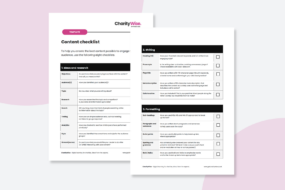
Your marketing efforts play a crucial role in building awareness, engaging supporters, and driving donations. Reflecting on your performance in 2023 is essential for continuous improvement and optimising strategies for this year and further beyond.
We’ve created this mini guide, designed to help your digital marketing team, no matter what size, to assess past performance and leverage key learnings to shape a more effective strategy for the upcoming year.
1. Assessing your previous year’s performance.
Evaluate your performance across all digital channels and acknowledge your accomplishments. If data is accessible, it’s crucial to adopt a year-on-year perspective, assessing areas of growth and identifying trends that can provide insights into predicting behaviours for the upcoming year.
Goals and Objectives:
- Review the goals set for the previous year and assess the extent to which they were achieved
- Evaluate your performance against key performance indicators (KPIs), such as website traffic, social media engagement, and donation conversion rates
Audience Analysis:
- If you have it to hand, analyse the demographic (age, gender, profession, location) and psychographic (personality, values, interests) data of your audience. Has this changed over time? Have any noticeable patterns emerged?
- Identify your most successful campaigns in terms of audience engagement and conversion
Channel Effectiveness:
- Evaluate the performance of each digital marketing channel (e.g., social media, email, PPC, SEO)
- Determine which channels drove the most traffic, engagement, and donations
- Was your strategy aligned with your actual channel performance
2. Key Learnings.
After reviewing last year’s performance, allocate time to delve into key learnings. Assess whether any changes to your approach are necessary for success this year. Identify emerging patterns that could significantly influence this year’s strategy and enhance your chances of success.
Campaign Analysis:
- Identify the most successful and unsuccessful campaigns
- Analyse the factors that contributed to the success or failure of each campaign
Audience Insights:
- Extract insights about your audience’s preferences, behaviours, and interests
- Understand the types of content that resonated most with your audience
Budget Allocation:
- Evaluate the effectiveness of budget allocation for different campaigns and channels
- Identify areas where resources could be reallocated for better results
3. Strategy Development for the New Year.
Armed with these valuable insights, you are now well-positioned to establish your goals for the upcoming year. If you’ve already set goals, this presents a perfect opportunity to double-check and potentially refine them based on the fresh insights gained from your performance assessment. This iterative process ensures your goals are aligned with the latest data and more likely to lead to successful outcomes.
Goal Setting:
- Set goals for the upcoming year based on the insights gained from the previous year
- Align your goals with your charities overall mission and objectives
Audience-Centric Approach:
- Refine your target audience based on the insights obtained
- Tailor content and messaging to better resonate with your audience
Multi-Channel Strategy:
- Develop an integrated multi-channel strategy, considering the strengths and weaknesses of each channel
- Leverage a mix of social media, email marketing, content marketing, and paid advertising
Budget Optimisation:
- Allocate budget strategically based on the performance of each channel and campaign
Continuous Learning and Adaptation:
- Explore cost-effective channels and tactics based on your learnings
- Implement a culture of continuous learning and adaptation
- Regularly monitor performance metrics and adjust strategies accordingly
4. Team Collaboration
Encourage active involvement from your teams at every stage of this process. Their valuable feedback may shed light on aspects that might have been overlooked. Collaborating throughout ensures that everyone is aligned with the goals set for this year, fostering a sense of shared ownership and commitment to success.
Monitoring and Reporting:
- Establish a system for regular monitoring and reporting of key performance metrics
- Use these reports to make data-driven decisions and adjust strategies as needed
By following this guide, your digital marketing team can turn past learnings into actionable insights, creating a more impactful and efficient strategy for the new year ahead.







